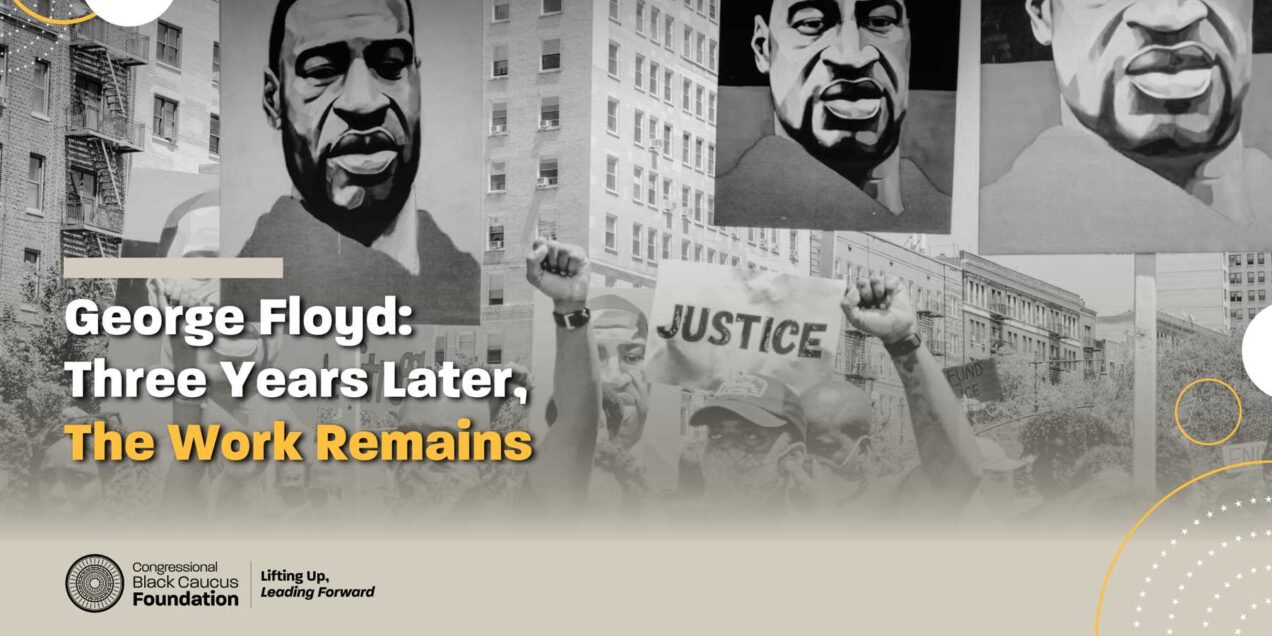By: Olajumoke Obayanju—Sr. Director, National Racial Equity Initiative for Social Justice, CBCF
George Floyd should still be alive.
Until we become radically honest with the callousness of policing in the United States, we will never reach justice. Until we call out the implicit hatred and dispassion towards Black bodies and lives in America, we will never achieve equity.
Just three years ago, the video of George Floyd’s murder spread nationwide, spurring an uprising for racial justice. As we honor George Floyd’s memory today, we must stop to observe what progress we have made.
On April 20, 2021, Derek Chauvin was found guilty of all charges against him for the murder of George Floyd and sentenced to 22.5 years in prison. It was one of the few times that the actions of a police officer met accountability. Historically, charges against officers who employ excessive force are rare, and convictions of severe charges are even rarer. While Chauvin’s verdict invoked a sense of progress and confidence in justice, lest not forget that days before the judgment, a police officer shot Daunte Wright during a traffic stop in Minnesota. And on the same day of the verdict decision, Ma’Khia Bryant, a 16-year-old girl, was fatally shot by an Ohio police officer.
“To protect and to serve.”
The number of fatal police shootings has risen over the years. Police killed 1,096 people in 2022—the highest number of people on record. In D.C. alone, police have killed two people this year, including a 17-year-old Black teen. Despite comprising only 13% of the country, Black people face 21% of police contact and 33% of those behind bars. Even more disturbing—but not surprising—is that Black Americans are killed at a much higher rate than whites. While public outrage and protests have led to modest change, there remains a systemically racist barricade thwarting real progress. Yes, bias exists in policing practices, but it also permeates our American legal systems.
Many losses, but let’s count the wins.
Since 2020, we’ve seen many legislative and policy wins across the nation. While these wins are incremental improvements, they do not absolve the fight for more change.
- Indiana passed a policing alternatives and collaboration bill that permits law enforcement with reasonable grounds to believe an individual has a mental illness to apprehend and transport them to the nearest appropriate facility.
- Maryland repealed its Law Enforcement Officers’ Bill of Rights — becoming the first state to do so.
- New York City Council passed a bill limiting qualified immunity and making it easier to sue police officers for illegal searches or using excessive force.
- San Francisco launched crisis response teams to respond to behavioral health calls instead of police.
- Washington state adopted 12 new laws that ban chokeholds, require officers to announce their presence before raiding a home and call for exhaustive de-escalation techniques before resorting to force.
It’s not lost on me that fixing our criminal legal system and uprooting the years of systemic racism is a long fight that requires interdisciplinary effort. Yet, it brings optimism to see the number of states that have passed police oversight bills, overhauled archaic laws, and increased police accountability.
Passing the George Floyd Justice in Policing Act of 2021
The George Floyd bill, re-introduced in the 117th Congress in February 2021, promotes restricting certain policing practices, enhancing police transparency and data collection, and establishing the best practices and training requirements for police. Though the bill passed the House, it was blocked in the Senate in September 2021. This is the first-ever, valiant piece of legislation aimed at combatting racial discrimination and excessive use of force in law enforcement; therefore, its opposition comes as no surprise. In the rise of police killings, we must continue the work to change the culture of policing, build trust between communities and law enforcement, and hold the criminal legal system accountable.
National Racial Equity Initiative for Social Justice
As the inaugural director of the CBCF’s National Racial Equity Initiative for Social Justice (NREI), I am reminded daily of George Floyd. His death is personal to me and the work that I do. His killing stirred the Congressional Black Caucus Foundation to bolster its position in advancing racial equity. His killing fortified our commitment to combating systemic injustice and the structural and systemic barriers of racism.
As we approach the third anniversary of the NREI, I am grateful for what we’ve accomplished and where we are headed. We’ve produced over 15 pieces of research to inform policy, tackling issues from welfare benefit bans for people with prior felony drug convictions to exploring reparations in Evanston, Illinois. We’ve awarded over $600,000 to 67 HBCU scholars committed to advancing equity, freedom, and justice for Black communities. We’ve accepted over a dozen John R. Lewis Social Justice Fellows, building a pipeline of young, Black professionals to address social justice on the Hill, in academia, in corporate spaces, and more. We’ve held nationwide community conversations, summits, and policy briefings on topics that center the marginalized, expose the broken system, and push for action-oriented solutions.
My work at the Congressional Black Caucus Foundation is forever tied to George Floyd’s legacy. Three years later, I am proud of the accomplishments of the NREI. Yet, I know that the fight is not over and that the work remains.
